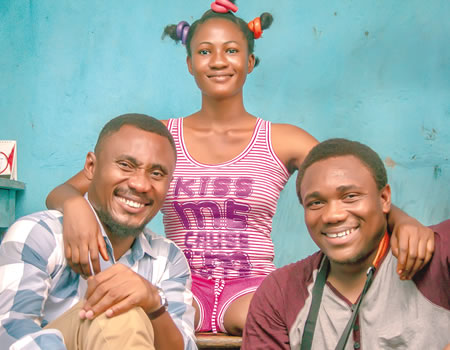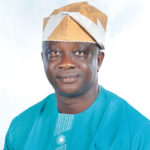How did you get interested in making movies?
My interest in film-making can be traced to my family background. My parents are veteran broadcasters and media moguls. My brothers and I had the opportunity of learning a whole lot from my parents and I must say a large chunk of what we do now is building on the foundation of what they exposed us to. Having spent my growing years working with my father, I was able to discover my interest and abilities quite early. Growing up, I consumed a lot of film and television contents, especially Nigerian movies. So I finally found myself in media alongside my brother and partner Adefemi Davies. It didn’t take us time to know we wanted to tell our own stories through films, photography and documentaries.
ALSO READ: Sacked government officials in Benue run away with vehicles
Your experience thus far?
I believe that my experience so far resonates with the typical struggle of most Nigeria film makers. It is firstly about pursuing purpose, exploring potential and expressing oneself to the fullest. Just like every field, film making comes with its truck load of challenges, disappointments and those moments you ask yourself if you are on the right path. However with the right spirit, conviction and God on your side, you will always scale through. There are moments of fulfilment and joy. There are lots of perks as well, but patience and steadfastness are hugely required.
Your short documentary was nominated for the AMVCAs, tell us about it.
Wow! I still remember how I screamed when I saw my name on TV. It is an unforgettable experience. We shot ‘OMIDAN: Styles Defunct’ in March 2017. It is one of my best documentaries so far but the thought of it contending with works across Africa to finally get nominated for the best documentary at the AMVCAs still beats me. The most humbling part is, I never even got to submit the full documentary. I created a shorter version for submission to a particular contest by Discovery channel. So, I uploaded the abridged version on YouTube for that purpose. I had challenges submitting the full documentary via the dedicated file for the AMVCA online submissions and I eventually had to submit with the YouTube link. So for a five-minute documentary to contend with hundreds of works across Africa (both long and short works), and eventually get shortlisted as part of just five finalists, it could only have been God. Truth be told, I always had the AMVCAs in mind, it had always been the deal for me, and it subliminally drove me.
What was the documentary about?
The ‘OMIDAN: Styles Defunct’ project was created as a photo and video documentary aimed at creating a depiction of the typical appearance of the young Yoruba, African girl. It is about African cultural background, emphasising naturalism and simplicity as attributes which characterised the essence of beauty in pre colonial and early colonial Yoruba society. Central to the theme of the project was the showcase of indigenous hairstyles which are made with the natural hair, a culture which is being fast forgotten. The documentary was aimed at taking the audience back in time by recreating the look and disposition of the young girl back in the day. There was also emphasis on showcasing the forgotten local hairstyles (‘irun didi’) that used to be in vogue in times past.
What next for you?
The AMVCAs nomination was a great blessing which I’m grateful for, but it only reminds me of the need to do more. I have a couple of documentaries on the line-up, some I’ve shot and will soon be released; others as projects on queue. As for movies, while we are still exploring possible opportunities open to our debut feature film, “Of Love and Marriage” (produced by my brother and I), we shall commence production of another major project before the year runs out.
Your mentors in the industry…
My first mentors are my father and brother. My brother also, who happens to be my partner, Adefemi Davies. I must say that he practically taught me all I know. In the film industry, I cannot underestimate the influence of the works on the great Tunde Kelani on my world view as a film-maker and a story teller in totality. Other great film-makers I respect so much and whose works I hugely learn from are Kunle Afolayan, Abiodun Jimoh of Prodigy and Pens, Shirley F. Manso, Biodun Stephens Ladigbo, Uduak Isong Oguamanam and Mary Njoku of ROK Studios. Akin Alabi and Clarence Peters are two gurus who inspire me.
Rate the movie industry in Nigeria
For me, the industry is doing really well. Definitely, there is still room for a lot of improvement but I think we are getting better. Across Africa and amongst Nigerians in the diaspora, there is more audience for Nollywood titles. Also, a lot of smart, business-oriented stakeholders in the industry are exploring the market. Now we have a better technology, foreign investment, diaspora market and more international recognition. The future is bright and the opportunities are limitless.
Challenges you currently face and proposed solutions?
The main challenge you face as a growing film maker here is funding. A good production even with a low budget still requires between three and five million. How does a young university graduate with a passion for making movies raise three million? Okay, we hear a lot about Nollyfund by the Bank of Industry (BOI) but I was surprised to find out that Jade Osiberu, whose movie “Isoken” was tagged to have been produced in association with BOI, had to make her mother’s house as collateral. Now, how many people have parents with houses in Lagos? Thank God for platforms like ROK Studios and Africa Magic who commission film makers to create content. So I hoped ROK will be a way out, to my surprise I learnt they do not work with new film-makers, except people with existing works that can be used as collateral. Invariably you are left with sourcing your funds yourself.
Infrastructures to support filming are also very limited. We hear about film villages in some foreign countries where you have structures to facilitate your shoot. Here people rent flats or houses from property owners at huge amounts to shoot for a period.
I believe Nollywood needs more investors who can come in with support funds to bail out producers. Nothing the government commits can be too much. Infrastructure should be provided. Laws should be made more flexible, and protection of rights properly enforced.
Background
My name is Aderemi Davies, alternatively known as AyaworanHO3D. I was born and raised in Ibadan. I am the last of three boys. For my primary education, I was one of the pioneer pupils of Rotimi Comprehensive Institute, Iyaganku G.R.A but finished from ECWA Model School in Challenge, Ibadan. My secondary education was at Government College Ibadan (GCI), Apata, Ibadan. For my Bachelor of Arts, I studied Religious Studies at University of Ibadan, graduating in 2011. I proceeded for a master’s degree in African Traditional Religion in the same institution, graduating in 2015.
As a young boy awaiting admission into the university, I took interest in graphics design and honed myself with the encouragement of my brother. My brand name which is a subset of the HO3D brand is AyaworanHO3D.






